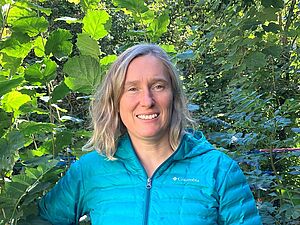"Nature has an incredible capacity for recovery"
Voices on biodiversity
Véronique Chevillat has been working at FiBL Switzerland for almost 20 years, and she advises farmers on how they can maintain and increase biodiversity on their farms. (Photo: Mathilde Bron)
Véronique Chevillat is a biologist and has been working at FiBL Switzerland in the Advisory & Education group for almost 20 years. She advises farmers on how they can maintain and increase biodiversity on their farms and was one of the founders of the biodiversity consulting course.
The state of biodiversity in Switzerland is worrying and poses major challenges for all sectors. As advisors for biodiversity in agriculture, we can assess the state of biodiversity in the fields in very concrete terms. We know that many areas appear to be of a higher ecological quality on paper than is the case outside in reality. But sometimes it is exactly the opposite and we find real treasures!
When I find a rare orchid in an extensive meadow, it makes me very happy. Unfortunately, in most cases there are only one or two specimens left. To survive in the long term, however, a population needs between 5,000 and 10,000 individuals. This is necessary to ensure genetic exchange and avoid inbreeding. But when was the last time I saw more than a few bee orchids or Venus`s looking-glass at one location? This question makes the decline in biodiversity more tangible and the challenges more concrete.
But it's worth persevering in such cases, because nature has an incredible ability to recover if good conditions are restored. For example, there was a case of saving and propagating two specimens of a rare orchid using adapted management measures. In that instance, we looked at the orchids together with the farm manager. They had never seen the flowers before but were delighted. We thought together: What can you do to save the orchids and ensure that they multiply? They decided to mow the part of the meadow with the orchids later so that they could bloom and go to seed. The next year we couldn't find any more orchids. But two years later, over 20 specimens have bloomed. We were all extremely happy!
Better promotion of biodiversity with targeted measures and expert advice
Agriculture is already doing a lot for biodiversity, but the potential for enhancement is still great. Several projects show that a decline in biodiversity can be slowed down with specific and targeted measures. The big challenge is to act more effectively and in a more targeted manner: To achieve this, it is essential to invest in training and information for farmers, because you can only protect what you know. On the other hand, the range of competent and target-oriented biodiversity advice must be expanded, because you can't learn everything at school and informing yourself takes time and motivation.
The advisors must be able to go out into the fields, as this is the only way they can see the rare orchid or the invasive and undesirable ragweed. By taking into account the situation of the entire farm as well as understanding the challenges of agriculture, they can recommend measures that can be easily embedded in the workflow, will support and complement production and can be applicable in the long term. The rigid framework of the Swiss Ordinance on Direct Payments sometimes prevents implementation. In order to enable targeted and effective measures, the system should therefore become more flexible and also allow measures outside the framework of these requirements.
Pascale Cornuz and Rebekka Frick from FiBL Switzerland have outlined how these goals can be achieved and farmers can be motivated with biodiversity advice and goal-oriented biodiversity promotion, which offers agricultural businesses more flexibility, in their "Voices on biodiversity".
When it comes to acting against the decline in biodiversity, agricultural businesses are at the forefront and have a direct influence on what happens on site. But they are dependent on the system and often do the best they can, to the best of their knowledge and belief and with the means and knowledge available to them. In order for them to succeed in promoting biodiversity, they need the recognition and support of everyone.
Further information
Contact
Links and Downloads
- bafu.ch: Scientific information on the state of biodiversity in Switzerland
- agrinatur.ch: Information platform on the promotion of biodiversity on farms, published by Agridea, the Swiss Ornithological Institute and FiBL Switzerland (in German and French)
- zielorientierte-biodiversitaet.ch: Website of the ZiBiF project (in German)
- fibl.org: "Course on biodiversity consulting on farms" in the FiBL project database
- scnat.ch: Article on a training course for biodiversity consultants in Hotspot Magazine 49/2024 (Pages 10/11, in German and French)




